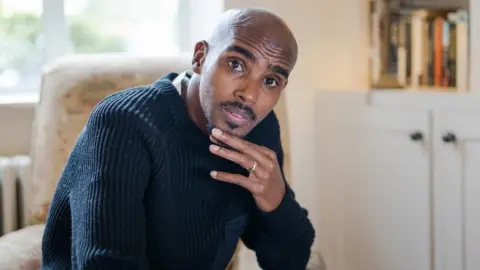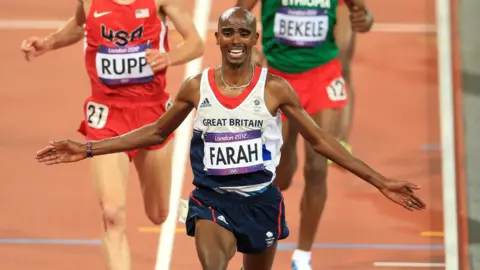Sir Mo Farah: Calls to trafficking helpline go up after revelation
 BBC
BBCCalls to a trafficking charity's helpline increased after Sir Mo Farah revealed that he had been brought to the UK illegally as a child.
Unseen UK told BBC News exclusively that it saw a 20% rise in calls, and a 15% rise in overall contact, including through their website and app.
The charity's director Justine Carter said some callers specifically said Sir Mo had inspired them to reach out.
The Olympic star revealed earlier this month how he was brought to the UK.
Speaking to a documentary made by BBC and Red Bull Studios, he said he was flown to the UK by a woman he didn't know, and given a name - Mohamed Farah - which belonged to another boy.
He added that his real name was Hussein Abdi Kahin.
Unseen UK told BBC News that in the week following Sir Mo's revelation, which was first publicised on 11 July, 231 people called its Modern Slavery and Exploitation Helpline (MSEH) compared to 192 the previous week. A total of 368 people contacted them on all of their platforms in that week, compared to 319 the week before.
Ms Carter told BBC News that the increase in calls was "really reassuring".
"It shows us that these types of high-profile stories really do have an impact with the public, and it's resonating with those who might have spotted something concerning or might have been in a situation that's similar to Sir Mo's and the story that he told to the BBC," she said.
"People feel very alone and isolated when they're in that situation themselves, so knowing that somebody else has been a victim of this type of crime - and is still suffering from all of the experiences that they've had as a child - I think is really crucial," she added.
"It gives those victims and survivors hope that they can continue to lead an independent life."
Ms Carter added that they have been contacted both by people currently in an exploitative situation, and those who went through it years ago but are still experiencing the effects.
 PA Media
PA MediaSir Mo told the documentary that he was born in the breakaway state of Somaliland, and that when he was eight or nine he was taken to stay with family in Djibouti. He was then flown to the UK by a woman he had never met and was not related to, but who told him he was going to live with relatives in Europe.
Sir Mo said he was made to do housework and childcare at the woman's flat in west London, and that she told him: "If you ever want to see your family again, don't say anything."
Shortly after Sir Mo's story was publicised, a coalition of anti-trafficking organisations and lawyers released a joint statement praising the athlete.
"[Sir Mo's] action should stand as an inspiration for us all and strengthen our resolve to identify trafficking, protect children and ensure that all victims of trafficking and slavery in the UK are able to safely come forward and secure the support they need to rebuild their lives," said the statement.
The Metropolitan Police also said it had opened an investigation into the allegations.
The woman who brought Sir Mo to London was approached by the BBC for comment about the documentary, but has not responded.
However, since it was broadcast on 13 July, relatives have defended her, saying that a lot of people brought children who were not their own from Somaliland to Europe for a better life, and that it was common in their culture for children to do household work.
